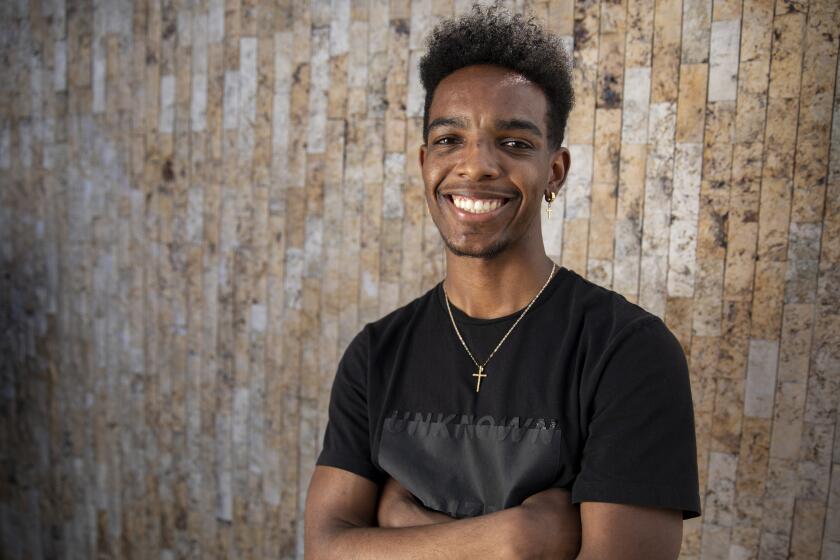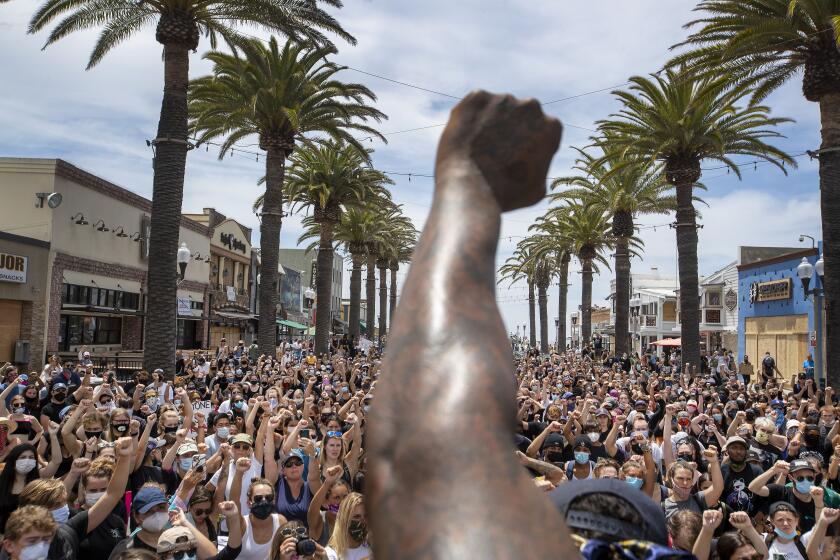I grew up Black near the Klan’s ‘Mount Rushmore.’ In gaslit America, we all live there now
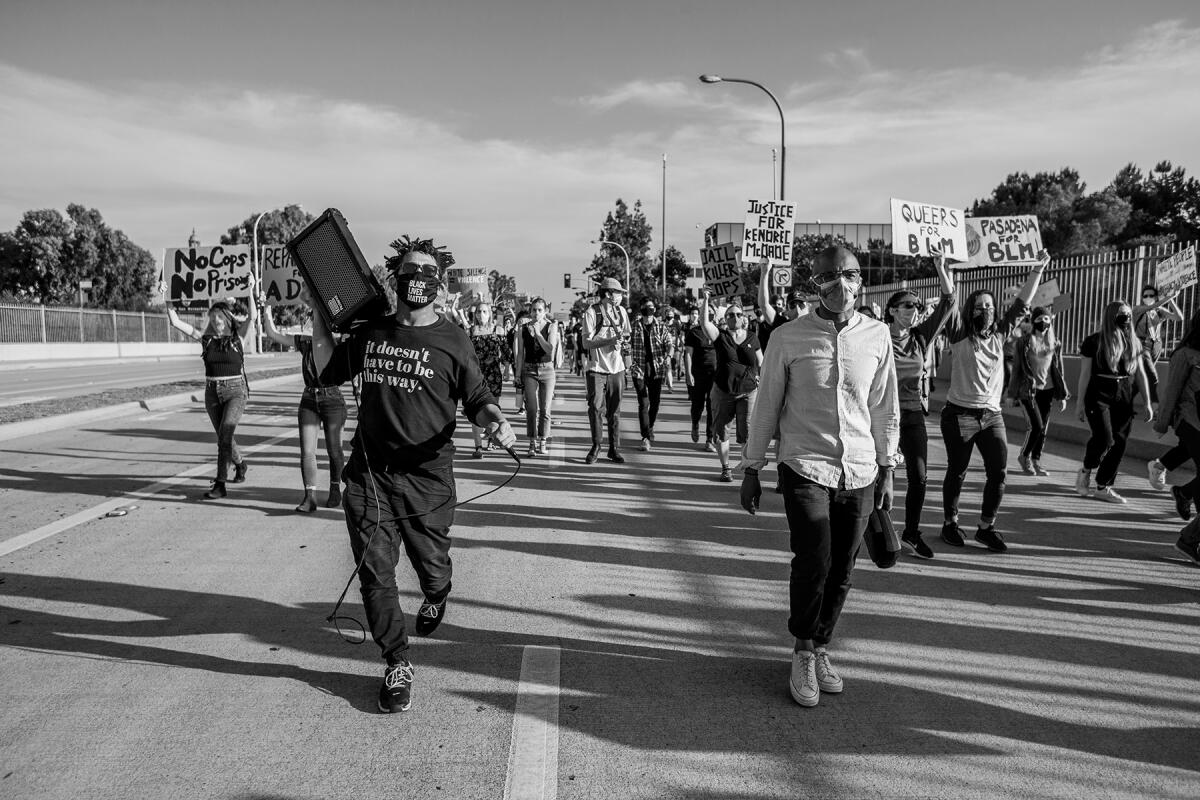
- Share via
This essay is adapted from Andre Henry’s new memoir, “All the White Friends I Couldn’t Keep: Hope — and Hard Pills to Swallow — About Fighting for Black Lives.”
I was raised in the shadow of Confederate Mount Rushmore in a small Georgia town called Stone Mountain. The city gets its name from a massive piece of quartz on the edge of town that hosts the largest bas-relief carving in the world: a giant depiction of Confederate generals Robert E. Lee and Stonewall Jackson and Confederate president Jefferson Davis on horseback. It was commissioned by Klan sympathizers who’d initially hoped to include a parade of Klansmen in the carving. The founders of the modern Ku Klux Klan first set fire to a cross on that very rock.
One Fourth of July, my sweet mother, a hard-working Jamaican immigrant, took my siblings and me to picnic at Stone Mountain Park with hundreds of other families. As night fell, she spread a blanket on the damp grass at the mountain’s base, passed around half-frozen Capri Suns and prepared us to watch the famous “Laser Show Spectacular.”
I was 9. Mom — “Mackie,” we called her — couldn’t stop grinning. She leaned in close and said, “There’s a part where they make the soldiers move!” After a few cartoons set to country songs I was too young and Black to recognize, the lights dimmed. The sound of a rolling snare drum came dragging its feet through the speakers, followed by the voice of Elvis Presley, singing, “I wish I was in the land of cotton / Old times there are not forgotten.” As the music crescendoed, a laser traced the carved figures of the generals until they were all standing in multicolored glory. Then the flickering silhouette of Gen. Lee turned his gaze on us mortals below, put on his hat, kicked his horse and began to ride. The crowd erupted into hoots and cheers.
In hindsight, it seems odd that a town would commemorate America’s birthday by applauding a band of American insurrectionists. Even odder is the memory of my Black mother wriggling her hips at the thought of a family picnic on the very ground where the KKK was resurrected.
If Mackie had recognized the laser show for what I do now — white supremacist pageantry — she might have marched our family right out of that neo-Confederate theme park and across the Caribbean Sea in a fury. But none of us was furious because we didn’t know the history in which we were participating.
Former U.S. Poet Laureate Natasha Trethewey always wrote of public pain and private struggle. Her memoir, “Memorial Drive,” lets her mother speak.
I didn’t learn about Stone Mountain’s Klan ties in history class or from neighbors or even in Stone Mountain Park. The white people I grew up around desperately wanted to cover up that history, just as white Americans today want to cover up this nation’s racist roots by banning whatever they decide to call “critical race theory.” They’d prefer to continue telling the big lie: “Racism is not a problem here.”
Nations built through racist violence — genocide, land theft, slavery — tell this lie about race to quell resistance and prevent political awakenings like the global uprising for Black lives we witnessed in 2020. Decade after decade, they try to convince people, even Black people, that there’s no need for disruptive, nonviolent action — no lunch-counter sit-ins, no massive marches from Bristol to Bogota in the name of George Floyd. They do this on the systemic level by hiding history (just as Stone Mountain Park hid its Klan ties) and on the personal level by telling Black people we’re exaggerating or indulging in a communal victim mentality.
“Gaslighting” is the term for this behavior, a tactic of psychological abuse in which the abuser tries to control the target’s perception of reality. It’s a common tactic because it works, and for a long time it worked on me.
Today, when I’m not busy producing music, I teach proven principles of nonviolent civil resistance to people around the world. I also work with local activists to build strategic nonviolent campaigns in the beloved City of Angels I call home. But my upbringing in the shadow of Confederate Mount Rushmore shows how effective systemic racial gaslighting can be.
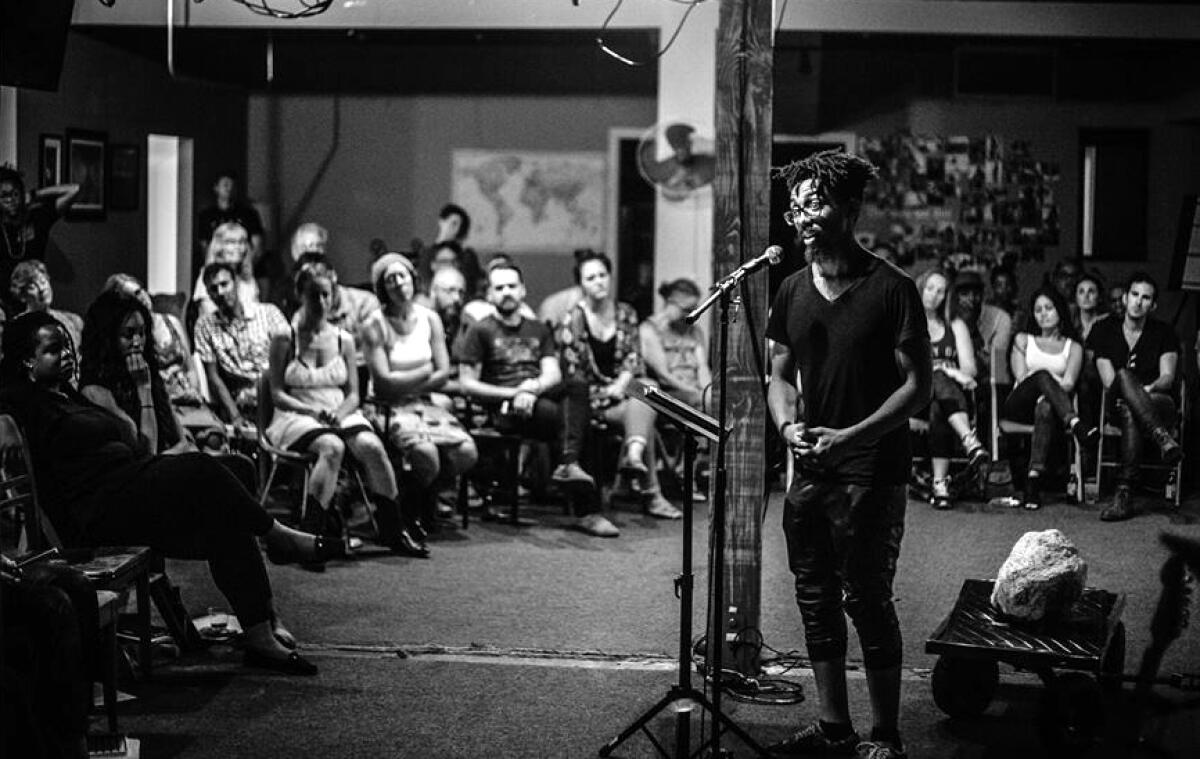
In my hometown, the white world’s big lie took the form of a mind-bending cocktail of Lost Cause propaganda and colorblind racism. When grown Black folks lamented the 1992 police assault of Rodney King, white people grumbled: “Why does everything always have to be about race!” The favored solution for Black suffering was to stop talking about race altogether. The reasoning went something like: “Maybe you’d be happier if you stopped focusing so much on being Black or white or whatever, just be a human being, ya know?”
For a long time, that’s exactly how I lived. I was that kid with an odd love of country. I remember lying on my bedroom floor and making charts and tables of the significant events of the American Revolution. By my college years, I was a full-blown token Black guy. You know the kind — the nerdy one who gets told by his white friends he’s not really Black because they’re not afraid of him.
All that changed as the litany of names of Black bodies reduced to hashtags pulled me into the Black Lives Matter movement. The horrific stories of Black people being killed because some white person found them “suspicious,” while just going about their lives, resonated with my own experiences of being randomly searched for drugs and weapons.
One year since the murder of George Floyd, which led to massive social justice protests nationwide, Angelenos reflect on the work that remains.
When I began speaking up about those experiences with racism, I was surprised to see some of the white people I loved most become my most ardent opponents.
I finally recognized their opposition as racial gaslighting in the spring of 2015, when a white woman named Sherry suddenly reappeared in my life on social media. I’d met her when I was a teenager. She was married to one of the youth group leaders at my home church in Stone Mountain. We hadn’t seen each other in ages.
Around that time, a young man named Freddie Gray was minding his business when he saw Baltimore Police and took off running, which the officers found suspicious. The video footage of Gray’s arrest was a gruesome display of stop-and-frisk brutality. The officers are seen folding him into dangerous contortions before dragging him into a police van. Gray died in police custody after suffering severe spinal injuries.
I was distraught as I watched this story unfold in the news. With a quivering lip and shaking fingers, I expressed my anger on Facebook with a poem:
“I am a black body / standing at the edge of space / neither seen nor heard / Violence! I shout / Injustice! I cry / The darkness drinks my voice / as stars glow / in the distance — impervious, apathetic— / and think me mad …”
That’s when Sherry pulled up with poetry of her own. “I feel like because I am a white star. I have no choice, no voice,” she wrote in response. I scratched my head. Did she just make my post about Black death about her white feelings? She did. It was inappropriate, but I was afraid I might offend her by saying so. “OK, Andre. De-escalate,” I told myself.
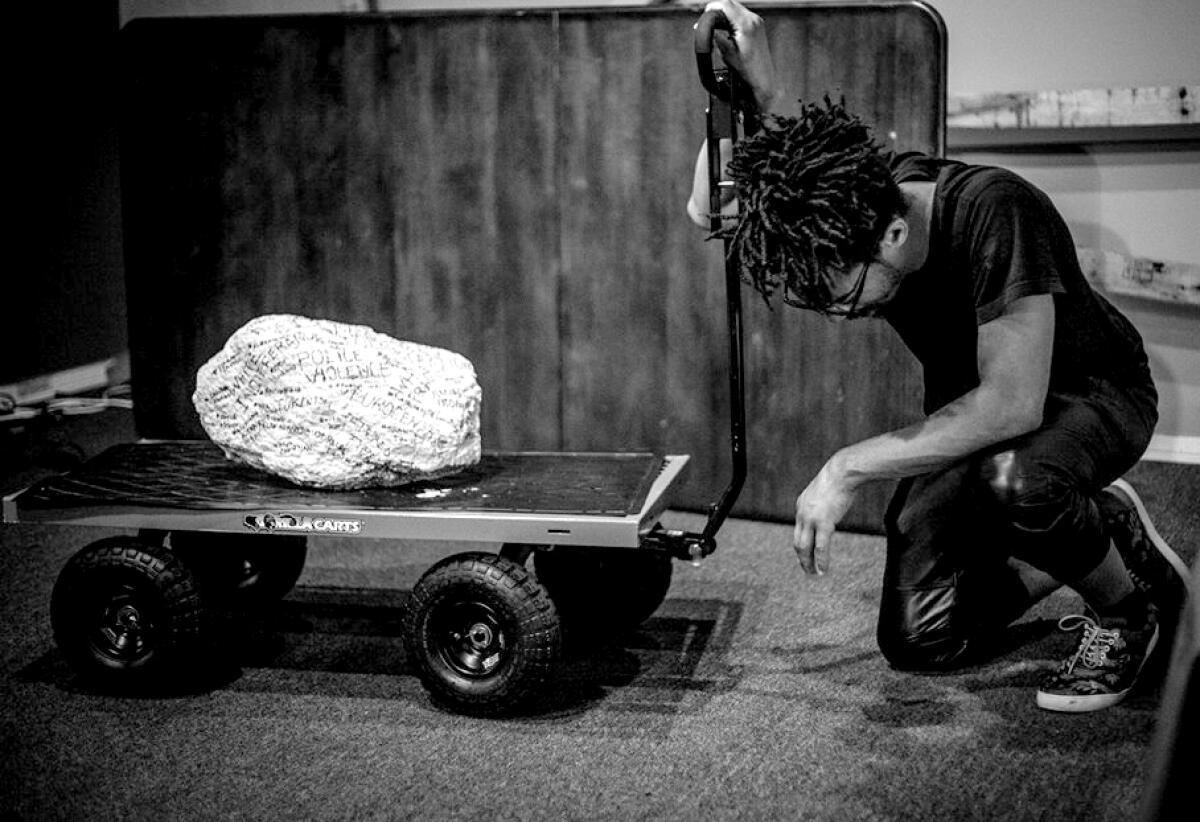
“I hope I didn’t make you feel like I’m referring to all white people,” I replied. “I’d hate that.” Sherry answered with more poetry, ending her lengthy stanzas with: “If you are going to describe by color, you WILL also divide by color.”
In the weeks that followed, Sherry was overly active in the comments on my Facebook posts, and she wasn’t the only one who took issue with me. I received direct messages from a few disgruntled white former college classmates, and it was getting exhausting. “I had no idea I went to college with so many racists,” I vented in a Facebook post.
“But honestly Andre.... are they all racist...?” Sherry responded. “Or they just don’t see everything the way you do? Racist is a really big, and often loaded, word.”
The writer and Princeton scholar on “South to America,” her personal and historical tour of the region, and why so many liberals are wrong about it.
When I read that comment, it finally occurred to me that Sherry hadn’t been so disruptive by accident. She’d been trying to undermine the conversation the whole time. With tears welling up, I wrote back to her: “I love you, but you’re not hearing me.” Then I hit the block button.
I couldn’t articulate why it felt necessary at the time, but I can now: Sherry was gaslighting me. I’ve heard some version of her question enough by now to know that when she asked, “But are they racist?” she was really challenging my ability to perceive the world accurately.
It would take me about a year to learn to stop arguing with the gaslighters. No matter how many questions they ask, I finally realized, they’re not looking for answers. They’re trying to stop the conversation. Better to save our energy, call BS and keep it moving.
Our best way to deal with the gaslighters is to strengthen our analysis of our situation without seeking their agreement. We hold fast to what we know and utilize that knowledge to create strategic plans for change. Our analysis of racism isn’t for them; it isn’t meant to try to persuade them. It’s for us, because an accurate analysis is the first step toward liberation.
The lies don’t look like they’ll subside any time soon. All I can do, today, is accept that unless we are fighting racism together, there’s nothing to debate.
Walter Mosley, Luis Rodriguez, the coiner of #BlackLivesMatter and others sketch a hopeful future for L.A. and the U.S. after George Floyd protests.
Copyright © 2022 by Andre Henry. Published by Convergent Books, an imprint of Random House, a division of Penguin Random House LLC.
“All the White Friends I Couldn’t Keep” is a work of nonfiction. Some names and identifying details have been changed.
Henry is an award-winning singer-songwriter, activist and author.
More to Read
Sign up for our Book Club newsletter
Get the latest news, events and more from the Los Angeles Times Book Club, and help us get L.A. reading and talking.
You may occasionally receive promotional content from the Los Angeles Times.
